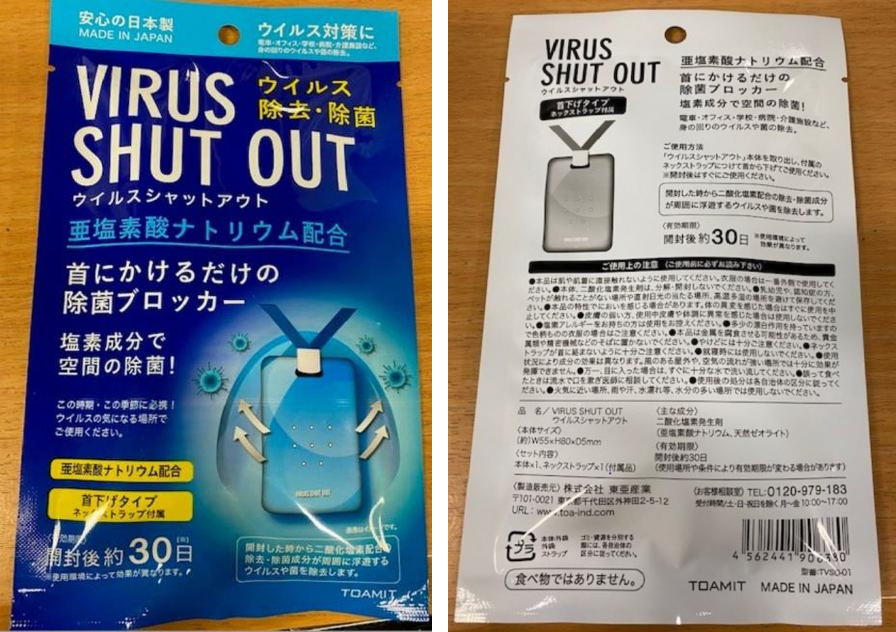U.S. EPA and CBP Act to Protect the Public from Unregistered “Virus Shut Out” Product Imported into San Francisco
Unsubstantiated claims to protect against viruses threaten public health
SAN FRANCISCO – Today, the U.S. Environmental Protection Agency (EPA) and U.S. Customs and Border Protection (CBP) announced they have prevented a significant number of shipments of illegal health products from entering the San Francisco International Airport (SFO). These products, such as the item Virus Shut Out, are not registered with the EPA and are being halted under federal pesticide laws. The safety and efficacy of these items against viruses have not been evaluated. In addition, their labeling – including directions for use – are not provided in the English language as required by law, and on-line advertising materials contain misleading claims about their safety and effectiveness.
EPA has been working with CBP to identify and seize the illegal products, which are being imported from Japan and Hong Kong through International Mail Facilities (IMFs) in San Francisco and Los Angeles. To date, CBP has seized more than 7,800 Virus Shut Out products. EPA and CBP will continue monitoring for products with illegal pesticidal claims. In addition, EPA has reached out to several companies to remove the products from their online marketplace.
“EPA takes our responsibility to protect Americans from fraudulent products seriously,” said EPA Administrator Andrew Wheeler. “EPA is increasing the number of approved disinfectants on the market while taking action to prevent dishonest actors from selling fraudulent and illegal items that do nothing to protect Americans from the coronavirus.”
"It is critical that people only use EPA-registered disinfectants and follow label directions for proper use," said EPA Pacific Southwest Regional Administrator John Busterud. "EPA will not tolerate companies selling illegal disinfectants and making false or misleading public health claims during this pandemic crisis."
“In the midst of this worldwide emergency, there are still those that would seek to take advantage by making false claims, scamming, and selling inferior products,” said CBP’s San Francisco Director of Field Operations Brian J. Humphrey. “CBP’s primary goal is to protect the American public, and we will not allow unauthorized products such as these to enter the country.”
Under the Federal Insecticide, Fungicide and Rodenticide Act, products that claim to kill or repel bacteria or germs are considered pesticides and must be registered with the EPA prior to distribution or sale. Public health claims can only be made regarding products that have been properly tested and are registered with the EPA. The agency will not register a pesticide until it has been determined that it will not pose an unreasonable risk when used according to the label directions. Products not registered by EPA can be harmful to human health, cause adverse effects, and may not be effective against the spread of germs.

EPA has released an expanded list of EPA-registered disinfectant products that have qualified for use against SARS-CoV-2, the novel coronavirus that causes COVID-19. The list contains over 370 additional products—including products that went through the expedited review process for emerging viral pathogens.
To view the most up-to-date list of EPA-registered disinfectant products, visit https://www.epa.gov/pesticide-registration/list-n-disinfectants-use-against-sars-cov-2
For more information on EPA resources on the coronavirus disease (COVID-19): https://www.epa.gov/coronavirus
For more information on pesticides, please visit: http://www.epa.gov/pesticides
About CBP:
With more than 60,000 employees, U.S. Customs and Border Protection, CBP, is one of the world's largest law enforcement organizations and is charged with keeping terrorists and their weapons out of the U.S. while facilitating lawful international travel and trade. As the United States’ first unified border entity, CBP takes a comprehensive approach to border management and control, combining customs, immigration, border security, and agricultural protection into one coordinated and supportive activity. CBP has direct responsibility for enhancing U.S. economic competitiveness. By reducing costs for industry and enforcing trade laws against counterfeit, unsafe, and fraudulently entered goods, CBP is working to enable legitimate trade, contribute to American economic prosperity, and protect against risks to public health and safety.
Learn more about CBP’s mission: www.cbp.gov
Learn more about EPA’s Pacific Southwest Region. Connect with us on Facebook and on Twitter.
###
